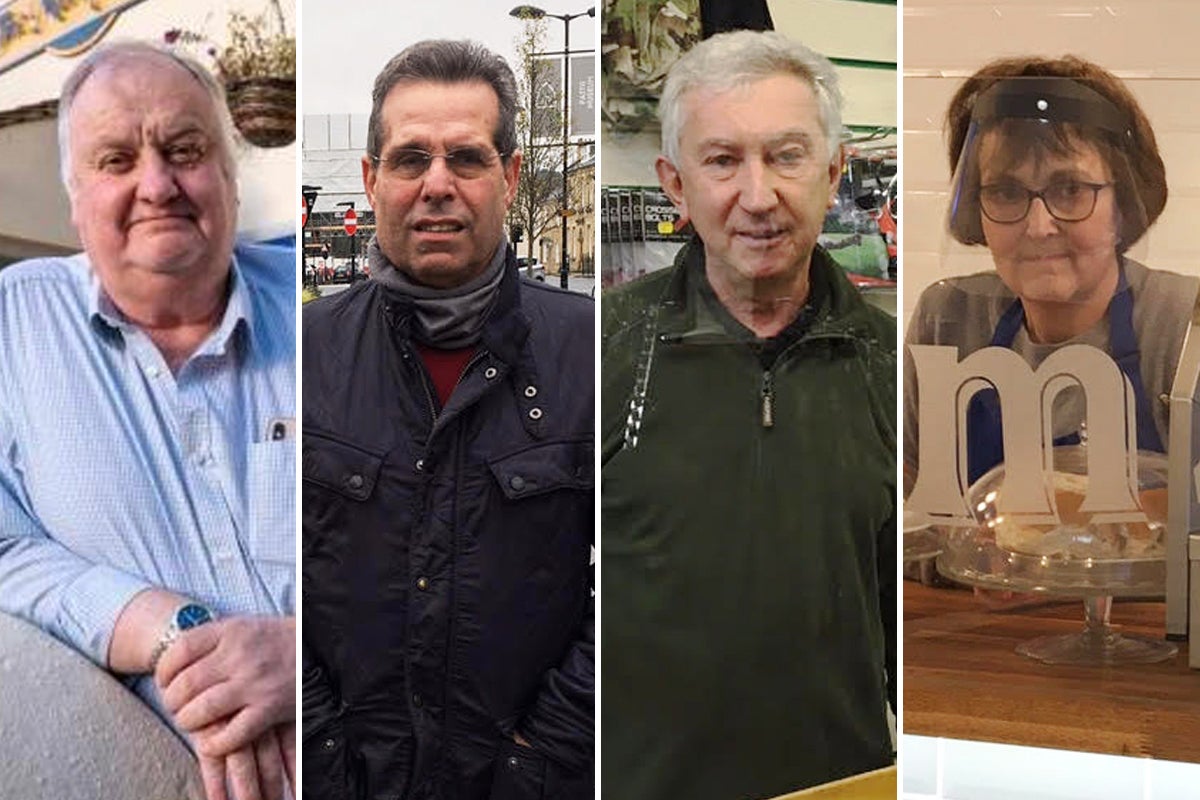Red wall’s fall, a year on: Voters in new blue Bishop Auckland say they still back Tories
Residents in the northeast market town tell Colin Drury they are happy with government handling of Brexit and coronavirus – but suggest promised ‘levelling up’ must be next priority


Sam Zair is Bishop Auckland born, bred and so proud to be from here, he says, that if you were to cut him in half, you’d see the name of the northeast market town “running through me”.
But walking along the high street with this cafe owner and grandfather of two is a sombre affair.
“You look up at the architecture of these old buildings and it’s a beautiful place,” the 65-year-old says. “Then you look down at the store fronts and it’s the most depressing thing you ever saw."
Almost a quarter of all shops here stand empty.
The decline of the high street of this once-thriving coal community has, even in an era of declining high streets, been brutal.
Major players, including M&S, H Samuel and Argos, have left and never returned. Grade II-listed Victorian buildings – such as the vast site occupied by Beales department store until 2017 – stand abandoned. Dominating two sides of what should be a historic marketplace are four large derelict pubs; they have been that way for almost a decade.
This, says Zair, is the visual representation of why, a year ago this week, Bishop Auckland – once one of the most solid electoral bricks in Labour’s great “red wall” – voted in a Conservative MP for the first time ever.
In one of the most astonishing moments of the 2019 general election, then 26-year-old Dehenna Davison unseated former shadow minister Helen Goodman. She did so by almost 8,000 votes; it wasn’t even close.
“We’ve had more or less a century of Labour,” says Zair, who also sits as an independent on Durham County Council. “And things have only been getting worse. People were fed up. I was fed up. We needed change.”
All of which raises a pertinent question: 12 months on, how do people here feel now about turning to the party of Thatcher, austerity and – a particularly sore point here – mine closures?
“I’ll put it this way,” says Zair. “If you had another [election] this week, I think the Tories would win again. Labour has lost too much ground.”
This may appear at odds with a recent poll suggesting that the Conservatives were already losing their grip on these seats, But if anyone should know about this stuff, it may well be Zair.
His cafe is something of an institution in the town. It has stood in Fore Bondgate – “the Shambles of Bishop” – since 1898 when his great-grandparents, fresh off the boat from Italy, set it up as a temperance bar. He himself was born in the flat upstairs. His mother gave birth to him in the same room his grandmother gave birth to his father.
Today, he runs the place – now simply called Sam Zair’s Cafe – along with wife Leslie, herself a former mayor of the town council and a formidable presence behind the counter.
“You lot [the media] said it was a surprise when it went [Conservative],” the 57-year-old says while cooking a burger. “I’ll tell you, it was no surprise in here. Everyone who came in said they’d be voting that way. Look at the town: it’s wonderful, but what a state it’s in.”
Peter Grainger, who runs The Barbershop in nearby North Bondgate, has a blunter turn of phrase: “It’s on the bones of its arse, man,” the 58-year-old notes. “I look around and can’t believe it’s the same place I grew up.”
How did he vote? He didn’t – he’s not into politics, he says, before we spend 20 minutes discussing, well, politics. The summary: “I have no issue with Boris,” Grainger concludes. “Government support kept my shop afloat through coronavirus … and he says he’ll prioritise the north – why not give him a chance?”
Bishop Auckland’s decline has been caused by several factors: internet shopping, out-of-town retail and, most acutely perhaps, the end of the surrounding area’s mining industry. What was a relatively prosperous community in the 1970s has now fallen into the 20 per cent of England’s most deprived areas. Some 39 per cent of children here live in poverty, according to a 2018 study by the Child Poverty Action Group. Wages are below the national average, and unemployment is above it.
No one necessarily blames Labour for these things. There is a sense that the issues go deeper than party politics, that a structural shift back to heavy industry is needed here, back to steel and energy creation.
But there is also a sense that the old party – which once had a 21,000 majority – stopped listening to the concerns of this community, that its priorities shifted to southern cities, culture wars and – under the last bloke at least – intractable issues in the Middle East that are a long way from, for instance, Spennymoor.
“Is Labour still the party of the working person?” muses one grandmother, queuing outside Card Factory. “I’m not sure. It’s not the same party my dad used to campaign for, I know that.”
The retired cleaner, who declines to give her name, is one of the few people The Independent speaks to today who didn’t vote Conservative. “I couldn’t bring myself to do it, love,” she says. A glance down the high street. “Although if they can get things better round here… ”
Bishop undoubtedly has potential. A millionaire city investor and out-of-towner, Jonathan Ruffer is currently ploughing £150m into the place in a surreal one-man campaign to turn it into a tourist destination.
The story – true or not – goes that he bought some paintings from historic Auckland Castle, which sits right behind the marketplace, but when he tried to have them moved, he was told a clause meant they had to stay at the castle – so he bought that too. Then he purchased a whole bunch of other nearby buildings for good measure.
Now, over the last eight years, he’s refurbished and opened the old fort, built a 29-metre viewing tower in the market square and is currently developing a Spanish art gallery and hotel project.
All that as it may be, 12 months on from the election, actual government investment remains thin on the ground – unless you count a a £750,000 grant to improve traffic signalling. In an email to The Independent, Davison says levelling up “is very close to my heart” but – save for the proposed dualling of a road skirting the edge of the constituency – fails to provide examples of any concrete projects.
“Have they done enough with regards levelling up?” says Christian Burns, a landlord who runs six pubs including The Merry Monk and The Reading Rooms. “No,” he answers simply.
Yet he, like many people here, is tolerant of this.
“With coronavirus, there’s not a government in the world who could have levelled up while dealing with that,” he says. “Could Jeremy Corbyn have done it? Not a cat in hell’s chance.”
Burns himself was a lifelong Labour voter until 2019 when he turned to the Tories after becoming disillusioned with both the party’s leader and Goodman. “She did nothing for the area,” he says. “She sat watching it decline while taking her £80,000 a year.”
As a publican in a tier 3 area, he has been on the front line of many of the hardest Covid-related decisions – the lockdowns, the 10pm curfew and the new alert system included – but he says furlough and business support have kept his bars (and his staff) afloat while allowing the wider health crisis to be managed.
“I wouldn’t have wanted Boris’s job for a gold cow,” says the 62-year-old, whose father and grandfather also ran pubs here. “It was an international disaster. Did he make mistakes? Yes. Do I blame him for making them? Not really. It was an impossible job.”
Would he vote Conservative again? He likes what he’s seen of Sir Keir Starmer but he will stay blue for now. No regrets? “A year on, none at all,” he replies.
Part of that is down to Davison.
She is popular in the constituency – which also includes Shildon and a certain Barnard Castle (FYI the overwhelming consensus is that he should have been sacked). “Her principles are completely red wall,” says Burns. “The lass just happens to be a Tory.”
Key among those principles, of course, is Brexit.
Some 61 per cent of people here voted to leave the EU in 2016, and when the transition ends at the end of this year, deal or no deal, this return to “sovereignty” may solidify Johnson’s support here for years to come.
“I think he’ll be treated as a hero among some people,” says Barry Coats, who runs Windrow Country Sports, a shop selling fishing tackle, outdoor wear and hunting guns. (“It’s bizarre, at the moment,” the 63-year-old notes. “We’re selling guns to people wearing masks.”)
On Brexit, he says he is aware it may end in some economic hardships, including for his own business.
“But that debate was had in 2016 and the country decided,” he says. “Labour shouldn’t have frustrated what people wanted. It became anti-democratic.”
Was the Tory vote up here a one-time thing to achieve that single political aim? “I don’t think so,” he says. “Places like this might vote Labour again, but it won’t ever be guaranteed like it once was.”
Back at Sam’s, it is a view echoed among the (takeaway-only) customers. As he waits for a pie and latte in the chill outside, a carpet fitter who voted for Brexit and then Boris, after a lifetime leaning towards Labour, considers the concept of the red wall.
“It’s gone for good,” he says decisively. “Both parties will have to win our votes in future.”
Join our commenting forum
Join thought-provoking conversations, follow other Independent readers and see their replies
Comments

Bookmark popover
Removed from bookmarks